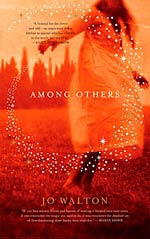
![]() Tar Daddoo
Tar Daddoo
12/17/2014
![]()
What is the Fantasy premise?
Among Others is the diary of Mori Phelps, a young girl who lives in present day England and believes in magic. Our challenge, as readers of her diary, is to determine whether we believe Mori's tales of magic or whether she is confused or deluded.
Where does the Fantasy premise come from and what governs its use?
Unlike the magic in many Fantasy novels, the magic that Mori tells us about is subtle. She says quite explicitly that it is difficult to control and always deniable. If you do not believe in magic, you will not perceive it as magic. Moreover, Mori is not yet an adult, is all but addicted to Science Fiction stories, and has been traumatized by some incident that we do not completely understand. We have a potentially unreliable witness telling us about fanciful events that cannot be verified. What are we to believe?
Is the impact of the premise on an individual explored?
This is a coming of age story for Mori. As we try to understand what has really happened to her, she tries to cope with a totally new and strange world. She has fled her mother in Wales to join her father in England who left her as a baby. Now, she is being packed off to a boarding school that holds very little appeal for her. She must simultaneously cope with growing up, being a stranger, recovering from physical and psychological trauma, and living in an impoverished magical environment.
Through all of this it is clear that magic informs Mori's world view. One of her most interesting musings concerns the ethics of using magic for one's own ends. She also considers the ways in which she encounters magic throughout her otherwise familiar life.
Is the impact of the premise on society explored?
Among Others is an example of magical realism. Magic is a part of the world in which we all live. It makes no sense to ask how magic affects society. This requires us to contemplate a society without magic, which can't really be.
How well written is the story?
The author writes well, but uses a technique that I found questionable. Throughout the book and with great frequency, Mori mentions Science Fiction stories, muses about their implications, and uses them to understand her own situation. Although I am probably better read in Science Fiction than most, I found some of the references difficult to follow, especially when characters from stories were discussed. When this happens, there is a tendency to feel left out and wondering whether the concepts you're missing are essential to the story.
For the most part the musings about Science Fiction are either nonessential or explained when important. Also, the author gains a lot by portraying Mori as a complete SF nerd; we learn what interests her and what she needs by way of companionship. Nevertheless, I always find it annoying when an author drowns me in unfamiliar literary references. While I got a kick out of recognizing the references for a change, I have to wonder how this must feel to the SF neophyte.
Can I recommend the book?
I am on the fence on this one. The ubiquitous references to Science Fiction continue to bother me. I keep wondering how I would feel if the references were either removed or substantially toned down. That would leave us with a well-written coming of age story portraying magic in the everyday world. The subtle portrayal of magic and the interesting musings about its uses, abuses, constraints, and potentials is really quite good. I'm not sure I care about another British boarding school story, but this is not overplayed.
Given that the Science Fiction references have not disappeared, I'll offer a qualified recommendation. For those who are up on their SF literature, especially 60's and 70's, give it a read. You'll probably get a kick out of understanding what's being talked about.
For those who are fond of magical realism, press through even if you don't know much about SF literature. The underlying story is worth knowing.
For everyone else, it's hard to say. If you like your fantasy overt, you won't find it here. If you like adventure, there is some, but not a lot. You're on your own.